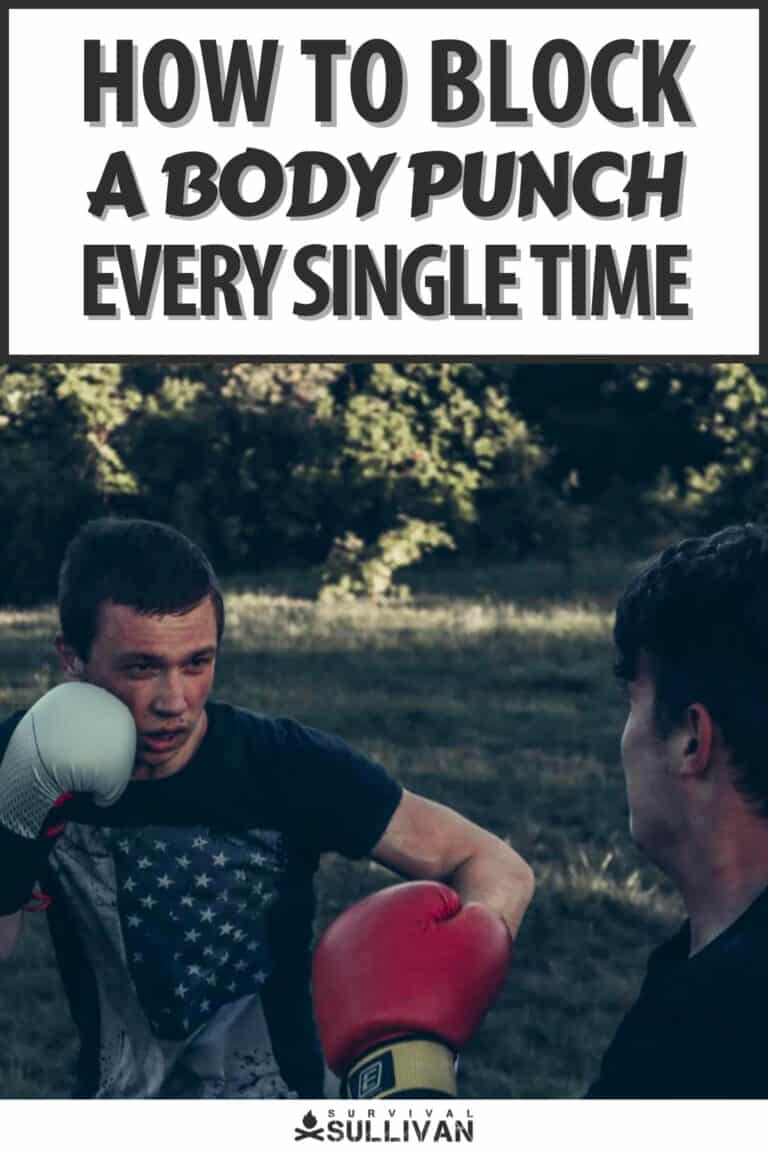You wouldn’t know it by looking at me, but I’ve been training in taekwondo for the last nine years and received my 1st Dan (1st Degree black belt) in December of 2020.

Part of the curriculum is, of course, sparring and as you can imagine I’ve had many, many sparring matches.
I’ve been kicked and punched in the ribs more times than I can count and it’s never pleasant.
With that in mind, how do you block a body shot every time? Can you block every shot? Well, let’s find out.
Before we do that, however, why do we block body shots? One reason is that they hurt – a lot.
Punches to the body can be excruciatingly painful and can leave a fighter winded and disoriented.
Shots to areas like the diaphragm will knock the air out of your lungs and shots to the liver can, if they’re strong enough, knock you out. Obviously, if you get knocked out you lose the fight.
Body Shots: Easy, Effective, and Painful
So, what is a body shot? A body shot is a blow – either a kick or punch – to the torso.
These shots are easy enough to throw and are often very effective; this isn’t surprising considering how excruciatingly painful they can be.
Targets on the body include:
- The ribs
- The sternum
- The diaphragm
- Solar plexus/abdomen
- Kidneys
- Liver
Blows to the ribs are seriously painful but they can take a while to be effective. The sternum is another hard target and can take a pounding.
Blows are painful and straight shots can be difficult to avoid. Now, when it comes to the diaphragm and solar plexus; shots to those areas knock the air out of your lungs.
As for kidney and liver shots…well…you want to avoid these like the plague because a well-placed shot can knock someone out.
Punches to the body can come from a variety of angles; this makes blocking/defending against them very difficult – especially for people who’ve never been in a fight.
Punches can come straight in, diagonal, upwards, and around in a circular motion. Fighters can also get creative and put their own spin on things making it that much harder to counter.

How do we Block or Defend Punches?
Okay, so now that we know a little bit about body shots, let’s look at how to defend against them.
Open-Handed Parry
Open-handed strikes are easy enough to throw and can be very, very effective. So, an open-handed parry is where you simply slap away your opponent’s hand/strike.
It’s effective, but it tends to leave you vulnerable by lowering your guard on one side.
Drop Your Elbow
Dropping your elbow is a bit tricky, the technique involves lowering your elbow and tilting your upper body to a slight angle so that your opponent’s fist connects with your elbow instead of your ribs, kidneys, and/or liver.
Rolling and Slipping
Rolling in a boxing match involves ‘rolling’ with or following the momentum of a punch – meaning if your opponent punches you in the head to the left, your head will go to the right, so you go right with the momentum instead of fighting against it.
It’s not a block in the typical sense of the word but it does allow you to set up some nasty spinning strikes and/or kicks.
Slipping is like rolling in that it’s not a block in the typical sense, you roll your shoulders and step under a strike either to the inside or to the outside.
Just Take the Shot
Now, obviously, there’s a huge difference between sport fighting and self-defense. The idea of just taking the shot is very simple; you get used to getting hit and it won’t bother you too much.
You don’t get disoriented too easily and can fight for longer. Of course, if you’re fighting for your life you don’t want to drag things out; you want to end things as fast as possible.
This is especially true if the other guy has a weapon of some sort (knife, firearm, rock, etc.) you don’t take chances in a street fight.
Don’t Drop Your Hands
I know, I know, this is obvious. If your hands drop, you’re vulnerable and can’t effectively defend yourself.
Here’s the problem – and this is especially true for rookies – keeping your arms in one position for an extended period gets tiring.
When you get tired, you get sloppy; your arms will drop, and you’ll be open to attacks. So, the bottom line is: don’t drop your hands!
Redirect Your Opponent’s Blow
Building on the previous point, you can redirect your opponent’s strike either by using an open-hand parry or your forearm/elbow.
It’s exactly what it sounds like and it’s much, much harder than it looks. You’re guiding your opponent’s strike away from your body and setting up a counter – which you’ll throw pretty much immediately.
This is Much Harder than it Looks!
I’ve said it before and I’ll say it again, reality is very different from fantasy. We all like to think we’ll rise to the occasion and be like Chuck Norris or Bruce Lee, but that’s not likely to happen.
Blocking/defending punches is not like in the movies, people like Chuck Norris make it look easy but it’s much harder than it looks.
The sad reality of the fighting, and I say this as someone with nine years of taekwondo under my belt (if you’ll forgive the expression), is that you can’t really block every punch.
Sooner or later, something will slip through and when it does whoa nelly is it going to hurt!
All that said, I hope all you lovely readers enjoyed the article and found it informative. As always, thanks for reading and I’ll see you in the next one! Until then, take care and stay safe out there!

The post How to Block a Body Punch Every Single Time appeared first on Survival Sullivan.
By: Greg Seebregts
Title: How to Block a Body Punch Every Single Time
Sourced From: www.survivalsullivan.com/blocking-body-punches/
Published Date: Thu, 23 Feb 2023 16:00:00 +0000
-------------------------------------------------------------------------
Did you miss our previous article...
https://outdoorsnewswire.com/survivalist/so-is-it-illegal-to-collect-rainwater-in-massachusetts
 CampingSurvivalistHuntingFishingExploringHikingPrivacy PolicyTerms And Conditions
CampingSurvivalistHuntingFishingExploringHikingPrivacy PolicyTerms And Conditions
